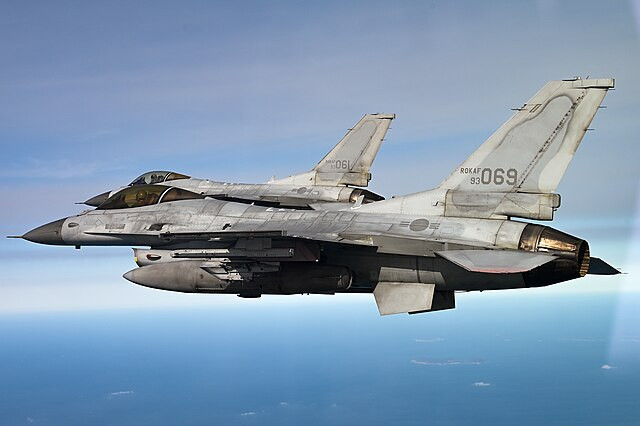South Korea has suspended all live-fire military drills and grounded Air Force training flights after two KF-16 fighter jets mistakenly dropped bombs on a civilian area, injuring 29 people, including 15 civilians and 14 soldiers. The incident occurred Thursday during joint U.S.-South Korea live-fire exercises near Pocheon, a city located 40 kilometers (25 miles) northeast of Seoul and near the heavily fortified border with North Korea.
The South Korean Defense Ministry confirmed Friday that nine of the injured remain hospitalized, with two in serious condition. The injuries include blast-related ear damage, migraines, and anxiety disorders caused by the explosions, officials said. Video footage captured the blasts shaking homes and buildings outside the designated training range.
The MK-82 air-to-surface bombs, each weighing 500 pounds (225 kg), were released due to a pilot entering incorrect target coordinates, according to the South Korean military. The misfire occurred during a field exercise linked to the larger Freedom Shield command post drills, an annual training operation with U.S. forces set to begin Monday.
"We take this incident very seriously," Col. Ryan Donald, spokesperson for the U.S. military in South Korea, said in a statement. "We are coordinating closely with the ROK Ministry of Defense and are committed to a thorough and transparent investigation." He confirmed that no U.S. aircraft were involved in the accidental bombing but that American personnel were participating in the training exercise.
Following the mishap, both the South Korean and U.S. militaries halted all live-fire exercises nationwide while an investigation is conducted. Additionally, South Korea's Air Force has suspended all non-essential flight operations except for surveillance and emergency missions.
Impact on U.S.-South Korea Military Exercises
The timing of the accident has raised concerns about potential disruptions to the upcoming Freedom Shield exercise, which serves as a key test of operational readiness between the U.S. and South Korean militaries.
Lee Illwoo, a military analyst at the Korea Defense Network, warned that the suspension of flight training could significantly impact the effectiveness of the exercise. He said flying warplanes would be crucial for assessing operational plans and determining the size of U.S. reinforcements in the event of a real conflict.
South Korean military officials insist the Freedom Shield exercise will proceed as planned, though training may be partially affected if flight operations remain paused beyond the start of drills on Monday.
Public and Political Fallout
The incident has fueled public criticism and protests in South Korea, particularly among Pocheon residents who have long expressed concerns about military training near civilian areas.
At a protest near the Defense Ministry in Seoul, local resident Lee Myoung-won questioned the necessity of the drills. "We, Pocheon citizens, are fundamentally questioning these ongoing military exercises," he said.
The accident also comes at a sensitive time in regional security, as North Korea has intensified its rhetoric against the U.S.-South Korea exercises, which it views as preparations for an invasion. On Friday, North Korean state media issued a statement warning that Washington and Seoul 'will have to pay dearly' for their military activities.
The mishap also poses a challenge for President Donald Trump, who has previously expressed skepticism over costly U.S. military exercises in South Korea. During his first term, Trump scaled back joint drills, citing their financial burden and his diplomatic efforts to engage North Korean leader Kim Jong Un. However, analysts suggest Trump may now place greater emphasis on strengthening U.S.-South Korea military cooperation amid rising tensions with China and North Korea.




